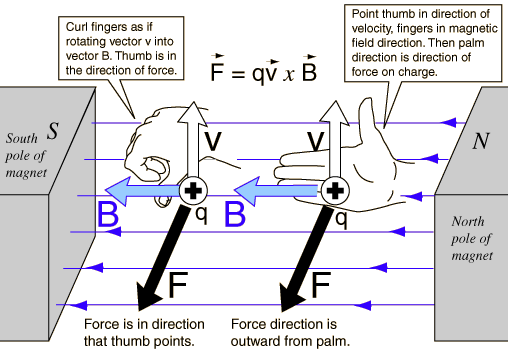Magnetic Force
The magnetic field B is defined from the Lorentz Force Law, and specifically from the magnetic force on a moving charge:

The implications of this expression include:
1. The force is perpendicular to both the velocity v of the charge q and the magnetic field B.
2. The magnitude of the force is F = qvB sin where
where  is the angle < 180 degrees between the velocity and the magnetic field. This implies that the magnetic force on a stationary charge or a charge moving parallel to the magnetic field is zero.
is the angle < 180 degrees between the velocity and the magnetic field. This implies that the magnetic force on a stationary charge or a charge moving parallel to the magnetic field is zero.
3. The direction of the force is given by the right hand rule. The force relationship above is in the form of a vector product.
From the force relationship above it can be deduced that the units of magnetic field are Newton seconds /(Coulomb meter) or Newtons per Ampere meter. This unit is named the Tesla. It is a large unit, and the smaller unit Gauss is used for small fields like the Earth's magnetic field. A Tesla is 10,000 Gauss. The Earth's magnetic field is on the order of half a Gauss.
| Magnetic interactions with charge | Magnetic force applications |
Electromagnetic force
Magnetic field concepts
| HyperPhysics***** Electricity and Magnetism | R Nave |


